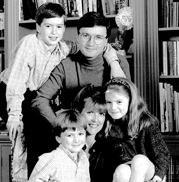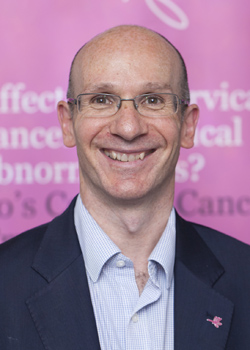 Now Jo’s Cervical Cancer Trust, established by James Maxwell to improve services and prevention, wants to make cervical cancer a thing of the past.
Now Jo’s Cervical Cancer Trust, established by James Maxwell to improve services and prevention, wants to make cervical cancer a thing of the past.
When she was diagnosed in 1995, Jo found it difficult to find good information about cervical cancer. She sought out charities and support groups for women with her condition but found none.
Jo’s Cervical Cancer Trust was set up by London businessman, James Maxwell (1957 – 2003) in memory of his wife, Jo (1959 – 1999) who died from cervical cancer at the age of 40.
Following her diagnosis in 1995, Jo (and James) had difficulty finding good information about every aspect of cervical cancer. It was their hope that one day everyone would have easy access to the best and most up to date information and medical advice.
Most importantly for Jo, it was her wish that women affected by cervical cancer would have the opportunity to communicate with others facing similar challenges.
The charity works to raise awareness of cervical cancer, its causes
When she died just four years later, James was left to write her death notice. His instinct was to include a line asking family and friends to make donations to a relevant charity – but there was no cervical cancer group. He decided he had to launch one.
Now known as Jo’s Cervical Cancer Trust, the charity is headed up by chief executive Robert Music and is based in London. The trustees include Jo’s daughter Lucy who was just seven years old when her mother died.
In the UK, where the charity’s work is focused, around eight women per day are diagnosed with cervical cancer. On average, three women lose their lives to the disease every day.
Survival rates are excellent if the disease is diagnosed in time, which is why routine cervical screening programmes are in place in most European countries.
Prevention
Virtually all of cervical cancer cases are caused by human papilloma viruses (HPV). Rather than trying to diagnose in time, the disease can now be prevented by vaccination. The UK has introduced a school-based HPV vaccination programme, offering adolescent girls free access to a vaccine that protects against two types of high-risk HPV. This is also something Jo’s Cervical Cancer Trust has actively campaigned for.
“These types of the virus cause 70% of all cervical cancers. That’s why the vaccine is so very important,” says Robert Music. “If we get uptake to around 80%, by 2025 we could see a two thirds reduction in incidence of cervical cancer in women under 30.”
Uptake of the vaccine in the UK is now at around 86% but Robert says the rates vary across the country. Jo’s Cervical Cancer Trust is working to raise awareness of the disease and the vaccine, with particular focus on areas where vaccine uptake and screening rates are low.
“People are increasingly aware that there is a vaccine but there are pockets where uptake isn’t as good as it is elsewhere. These include certain parts of London and areas in the north west of England.”
Support services

Robert says his organisation wants more people to know that cervical cancer is caused by a virus which can be spread through genital contact. The Trust is also continuing to remind women aged 25 to 64 that they are covered by a free cervical screening programme.
Jo’s Cervical Cancer Trust offers a range of support services including a helpline, an online forum and an Ask The Expert service which provides information and reassurance from 40 medical experts.
The ultimate goal is to reduce the number of women whose stories echo that of Jo Maxwell.
“Our long-term vision is to eliminate cervical cancer in the UK. No woman should die from cervical cancer.”
Watch: Helen’s Cervical Cancer story
Read: Transcript of interview with Robert Music, Jo’s Cervical Cancer Trust
Vaccines Today: How common is cervical cancer?
Robert Music: About 3,000 women are diagnosed in the UK every day and just under 1,000 of those die. That’s around eight women diagnosed per day. Around 3 women per day lose their lives.
Vaccines Today: What age group is most commonly affected?
Robert Music: All ages can be affected. Cervical cancer is caused by human papilloma virus – HPV. We are all at risk of being exposed to the virus as soon as we are sexually active. Around 80% of us will have HPV at some point in our lifetime.
Vaccines Today: For those diagnosed with cervical cancer, what are the survival rates?
Robert Music: Survival depends on how advanced the cancer is when they are diagnosed. If they are diagnosed very early the five-year survival rates are very good. It is a largely preventable disease but for those who develop it the outcomes depend on when you are diagnosed.
Vaccines Today: Is cervical screening promoted in the UK?
Robert Music: Yes, in England, Wales and Northern Ireland, screening is offered for women aged 25 to 65. Scotland’s screening programme has been slightly different but will soon be aligned with the others. For women aged 25 to 49, screening should take place every three years. Women aged 50 to 64 should be screened every five years.
Vaccines Today: Detection is clearly very important. Can the disease be prevented?
Robert Music: HPV is a very common virus. You can reduce the risk of cervical cancer by having the HPV vaccine. We have a school-based programme in the UK which protects against two types of high-risk HPV that cause around 70% of all cervical cancers. That’s why it’s so very important. If we get uptake to around 80%, by 2025 we could see a two thirds reduction in incidence in women under 30. Uptake is now around 86% but we won’t see the long-term benefits for quite a number of years.
Cervical screening to detect precancerous cells is also about prevention – we can prevent precancerous cells from developing into invasive cancers. There has been an unfortunate decline in screening which we want to reverse.
Vaccines Today: Do you think the link between HPV and cervical cancer is well understood by the public?
Robert Music: We still think understanding is quite low. We funded some research about the link between HPV and cervical cancer and it is not well appreciated. People don’t realise that HPV causes virtually all cervical cancers.
Vaccines Today: Is there strong awareness that there is a vaccine?
Robert Music: People are increasingly aware thanks to the national immunisation programme. There are pockets where uptake isn’t as good – such as certain parts of London and the north west of England.
Vaccines Today: Tell us about Jo’s Cervical Cancer Trust. How did it come about?
Robert Music: The charity was set up in 1999 by James Maxwell in memory of his wife Jo who died at the age of 40. James wanted to address three big issues: he and Jo found it hard to meet others going through what they were going through; it was difficult to get information on the disease; and there was no charity actively working in this area. We are still the only UK charity working to get the best supports, treatments and prevention for the public.
Vaccines Today: What does Jo’s Trust do?
Robert Music: There is a range of support services – online and face to face. We have an active online forum. Our Ask the expert service is provided by around 40 medical experts who volunteer their time. This service is growing and can be very reassuring. We run a helpline and support groups, and all the information we publish on the vaccine, screening and health education is reviewed by experts.
In addition we are active at a policy level where we encourage more time and resources for cervical cancer prevention and care.
Vaccines Today: Do you believe cervical cancer could be consigned to the history books?
Robert Music: Our long-term vision is to eliminate cervical cancer in the UK. No woman should die from cervical cancer.




